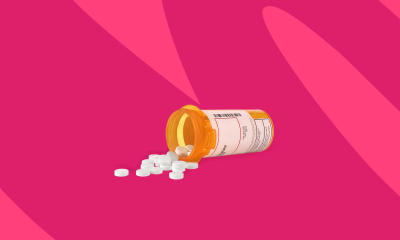Health
6 Benefits of Butterbur herb and side effects

6 Benefits of Butterbur Herb and side effects.
Seasonal allergies are often accompanied by a flurry of unpleasant symptoms. Sneezing, sniffling and itchy eyes are just some of the annoying side effects that come with the season.
If you’re like most, you’ve probably desperately reached for antihistamines to find quick relief from your allergies only to experience additional symptoms like drowsiness, dry mouth, or nausea.
Fortunately, there are natural allergy remedies, like the herb butterbur, that can help prevent symptoms without the unpleasant side effects.
Butterbur herb is good for more than just allergy season. It can be used year-round to relieve inflammation, prevent migraines, reduce asthma symptoms, and even protect the brain and heart from damage.
In the past, it was also used as a traditional treatment to help heal wounds, reduce symptoms of urinary tract infection, and fight fevers.
Available in a convenient capsule form, adding butterbur herb to your medicine cabinet can have a huge impact on your health and may even reduce your need for other medications.
Benefits of Butterbur Herb
1.- treats seasonal allergies
Allergic rhinitis, also known as hay fever or seasonal allergies, is an allergic response that produces symptoms such as sneezing and itchy eyes.
Although traditional treatment includes medications such as antihistamines, steroids, and decongestants, the herb butterbur can be an effective natural alternative to help reduce symptoms.
In one study, butterbur extract was shown to be significantly more effective in treating hay fever than placebo in a randomized, double-blind, placebo-controlled, parallel-group comparison.
In another study, the effects of butterbur were compared to cetirizine, also known as Zyrtec, a drug used to treat seasonal allergies. Not only was butterbur as effective as cetirizine in improving symptoms, but it also produced fewer negative side effects, such as drowsiness and fatigue.
For those who suffer from seasonal allergies, butterbur can be a great option to help lessen symptoms and avoid the adverse side effects that can occur with traditional medications.
2.- Relieves migraines
If you’ve ever suffered from migraines, you’re probably all too familiar with the long list of migraine symptoms that come with them.
Throbbing pain, sensitivity to light and sound, dizziness, nausea, and vomiting are all common side effects when you have a migraine.
Fortunately, many natural remedies can help lessen symptoms. Butterbur herb extract has been shown to help naturally treat migraines.
In one study, the benefits of butterbur cut migraine frequency by 48 percent over a four-month treatment period. Another trial found similar results, showing that the herb decreased the number of migraines by 47 percent and was significantly more effective than a placebo.
Additional research focused only on children and adolescents who took butterbur and found that migraine frequency was reduced by 63 percent, and 91 percent still felt improvements four months after treatment.
If you suffer from frequent migraines, butterbur can be a great natural remedy to have on hand. You may also want to consider other natural remedies, such as feverfew, which have been shown to provide migraine relief as well.
3.- Reduces asthma symptoms
Asthma is a common problem throughout the world, affecting approximately 300 million people and accounting for 250,000 premature deaths each year.
Some evidence shows that the benefits of butterbur herb could be used in combination with traditional treatment to help improve asthma symptoms.
One study measured the effects of butterbur in 80 participants with asthma for four months. Not only did the severity, duration, and number of asthma attacks decrease, but symptoms also improved, and 40 percent of participants reduced their use of asthma medications.
An animal study also showed that butterbur has potent anti-inflammatory properties that can help treat asthma.
Using butterbur, alone or with other asthma treatments, might help reduce asthma symptoms and severity while reducing the number of asthma attacks.
4.- Protects the brain
Interestingly, there is some evidence showing that butterbur might help keep your brain healthy and protect against oxidative damage.
Oxidative damage is caused by the buildup of damaging free radicals, compounds that form as a result of factors such as stress, pollution, and a poor diet. If antioxidants don’t neutralize free radicals, they can cause cell damage and even lead to chronic disease.
An animal study showed that the herb butterbur has a protective effect on the brain. It was able to prevent damage to the brain even after a neurotoxin was administered.
The herb butterbur also contains a plant compound called kaempferol, which is also found in foods such as broccoli, Brussels sprouts, spinach, apples, and green tea. Kaempferol boasts a long list of health benefits and has even been shown to prevent oxidative damage to the brain.
Compounds found in butterbur may help keep your brain healthy and prevent degenerative brain disorders such as dementia and Alzheimer’s disease.
5.- Promotes heart health
The herb butterbur is full of health-promoting compounds and antioxidants that can help improve your heart health and reduce certain risk factors for heart disease.
In an animal study, butterbur supplementation was shown to decrease total cholesterol, bad LDL cholesterol, and oxidative stress in mice. Another animal study also found that it improved cholesterol concentrations and even reduced body weight and fat accumulation.
The kaempferol found in this herb may also benefit heart health. Several studies have shown that it can protect against heart damage caused by heart attacks.
6.- Reduces inflammation
Although inflammation is a normal response of the immune system, more and more emerging research shows that chronic inflammation may be at the root of many diseases. Inflammation is thought to contribute to diseases like obesity, cancer, diabetes, and heart disease.
The herb butterbur contains powerful anti-inflammatory properties and has been shown to prevent the buildup of inflammatory cells in the body. Kaempferol, one of the components found in butterbur, also contains anti-inflammatory properties.
An animal study showed that kaempferol reduced levels of inflammatory markers and reduced oxidative stress in mice.
According to these studies, pairing butterbur with a balanced diet and healthy lifestyle may help decrease inflammation and prevent chronic disease.
How To Use Butterbur Herb
The herb butterbur is most commonly found as a supplement in capsule form and is widely available at most natural health stores, drug stores, and online retailers.
It is also found in some natural medicines, such as Petadolex. Petadolex is a medicine containing butterbur that is used to promote blood flow and prevent migraines.
Most studies show that butterbur is most effective when given in doses of 50 to 75 milligrams twice daily. You may want to start with a smaller amount and gradually increase your intake to assess tolerance.
Be aware that some butterbur-containing products may also contain pyrrolizidine alkaloids (PAs), a type of chemical that can cause liver damage and other adverse side effects. If you have liver problems, avoid raw butterbur and look for butterbur-free products to avoid this harmful chemical.
Also, be sure to look for a trusted brand with minimal ingredients to ensure you’re getting the best quality possible.
The butterbur plant in dried form or extract can also be used to make an allergy-fighting tea.
Butterbur Herb Side Effects and Precautions
Although generally safe and well-tolerated, some people may want to avoid butterbur.
Some people may be allergic to this herb. Butterfly allergies are more common in those who are also sensitive to other plants in the same family, such as ragweed, daisies, marigolds, and chrysanthemums. If you experience symptoms such as hives, itching, or swelling of the throat, you should stop using immediately and talk to your doctor.
If you are pregnant or nursing, the use of butterbur is not recommended as its effects have not yet been studied. Also, although it is safe and effective for children, it should only be given to children under the supervision of a healthcare professional.
You should also make sure to only use products labeled certified PA-free to avoid liver damage and other negative effects. Consuming raw, unprocessed butterbur is not recommended for those with liver problems in particular, as these harmful chemicals have not been removed.
Common side effects of butterbur include headache, diarrhea, fatigue, belching, and itchy eyes.
As always, if you experience negative side effects, you may want to lower the dosage or discontinue use and consult with your doctor.
Final Thoughts on Butterbur Herb Benefits
The butterbur herb has a long history of being used as a medicinal herb, treating everything from the plague to fevers and wounds.
Several recent studies have shown that it can effectively treat migraines, reduce seasonal allergy symptoms, protect the heart and brain, relieve inflammation, and lessen the severity of asthma.
It’s easy to add butterbur into your daily routine whether you’re using a supplement once or twice a day or brewing an occasional cup of butterbur tea.
Use alone or with other natural remedies in conjunction with a healthy lifestyle to help improve certain conditions and move toward better health.
Health
10 Benefits of charcoal soap and side effects

Table of Contents
Health
10 Benefits of long bell peppers

Discover the 10 health benefits of long bell peppers.
The long peppers may sound unfamiliar to some, but not in the ears of the Javanese. In Java, it is also known as Javanese pepper, with the scientific name of Piper Retrofractum Vahl.
It is considered as a spice and is commonly used for jamu, which is an Indonesian traditional herbal drink, hence its nickname is “cabe jamu” or jamu pepper.
If you want to learn more about long peppers, you are absolutely on the right track! For your information, long peppers grow at a maximum altitude of 600 m with 1,259 mm/year of rain. Anyway, what exactly is a long pepper?
Long peppers are also known as Balinese pepper or Indian pepper, following their original roots in South Asia, particularly India and Sri Lanka.
In India, long peppers are called ‘pippali’. Long peppers have four main functions, especially as a home remedy, cooking ingredient, medicinal herb, and catalyst to enhance the effects of other herbs.
The benefits of Javanese long peppers are somewhat similar to the health benefits of Indian long peppers.
Just as their scientific name suggests, long peppers contain piperine. Piperine is an alkaloid that works as a stimulant for poor blood circulation. Piperine is also found in black pepper and is also responsible for making both of them spicy.
Now here is the main question; Do long peppers have other uses besides being spices and a cooking ingredient? Yes, it does, and here are the health benefits of long pepper.
10 health benefits of long bell peppers
1.- Good for liver ailments
• Liver disease arises from our habit of indulging in unhealthy junk foods.
• At the end of the day, the liver becomes overworked.
• Long bell peppers balance the liver’s workload by removing toxins that have built up in the liver and that have been produced by digesting these types of foods.
• Here are also the best quick way to detox the liver after several years of drinking.
2.- Helps to lose weight
• The long pepper can burn fatty acids similar to other types of pepper without any side effects.
• In fact, it is considered a safer and healthier alternative compared to its clinical counterparts.
3.- Reduces the risk of diabetes
• Like the health benefits of red rice for diabetics, long bell peppers help alleviate diabetes by regulating the rate of glucose released into the blood system.
• Long peppers also stimulate insulin production.
• That is the main reason why long pepper is highly recommended for diabetic patients.
4.- Decreases bacterial infection
• The risk of bacterial infection may incline as the daily temperature increases.
• Unhygienic food, as well as unsterile water, can be prone to bacterial infection, causing an upset stomach.
• Long peppers can be used to counter these occurrences.
5.- Serves as a cough treatment
Long peppers treat a cough by making it a simple remedy. This is how you do it:
Step 1: Take 1 to 2 grams of the spice and fry it with a little ghee. Ghee is a kind of Indian butter.
Step 2: Bring it in while it cools.
If ghee is not available, you can use honey instead.
6.- Relieves indigestion
• The content of long peppers is capable of curing digestive problems.
7.- Decrease fever
• The antiseptic and antiseptic properties of long pepper can reduce fever or relax the throat.
• You can easily reduce a fever by mixing long pepper with a hot bowl of soup.
8.- Relieves toothache
• You can also cure a toothache by making a paste with pepper, salt, and water.
9.- Cure diarrhea
• Diarrhea can be cured by consuming a long pepper soup.
10.- Relieves asthma
• Long peppers are an alternative to relieve occasional asthma attacks and other asthma symptoms.
• However, you should not use it as a substitute for respiratory medicine.
How to use long peppers for traditional cures
About the previous pointers on the health benefits of long pepper, here are the simple recipes to make your long pepper remedy.
1.- To lower the fever
• Step 1 – Prepare 3g of dried long peppers
• Step 2 – Smooth until it reaches its softest state.
• Step 3: Infuse with hot water and consume.
• Despite its hot taste, it is suitable for both children and adults.
2.- It is a cure for toothache
• Step 1 – Prepare 3 long pepper leaves
• Step 2: squash them, but not to their smoothest shape.
• Step 3: prepare it in warm water
• Step 4: Use the gargle formula. Do it regularly until the toothache is completely gone.
3.- To overcome «Masuk Angin»
Masuk angin is an Indonesian term to describe the uneven distribution of gases within the body characterized by cold-like symptoms.
It has no direct translation into English, and no specific knowledge of this ‘disease’, therefore making ‘masuk angin’ is a large loose term. Long peppers can be treated ‘masuk angin’ by following this simple formula:
• Step 1 – Prepare 3g of long peppers, some brown sugar, ginger, and “temulawak” (Curcuma Zanthorrhiza).
• Step 2 – Boil until everything is softened and add warm water.
• Step 3 – Drink that formula while it’s still hot.
4.- Prevents abdominal spasm
• Step 1: Take 3 long pepper leaves and add a glass of water.
• Step 2: Boil both of them fully and let them cool for a while.
• Step 3: consume completely.
5.- Clean the postpartum ovary
• Step 1: Prepare 3 grams of long pepper roots.
• Step 2: Add warm water and bring to a full boil.
• Step 3 – Filter the water when you are done.
• Step 4: Consume the boiled water until done. It is suggested to consume it while it is still hot.
Those are just the healthy creations you can make with long bell peppers. The recipes are not proprietary so you can easily adjust them to better suit your preferences or requirements.
However, it is still highly recommended that you follow exactly what is written above. In addition to the long bell pepper uses listed above, there will be more below, however, the ones below are not specifically categorized by disease.
Generic long pepper recipe
Step 1 – Boil 150cc of water.
• Step 2 – Make it with 4 grams of pepper powder.
• Step 3: Consume while hot to get your maximum benefit.
If there are still long pepper powders left, you can also use them like this:
• Fill it inside the capsules for consumption at any time.
• Apply the powders directly to the affected area for toothache.
• Use it to treat swollen gums.
• In addition to health, long peppers are equally useful for planting and soil fertility.
• Thirty-eight uses of long peppers can be obtained by using them in a “jamu” or a traditional herbal drink, which has the potential to cure practically everything but the insecticide.
• Long pepper does not work with insecticide because it kills the reaction of the insecticide inside the plants.
Those are just the top long pepper health benefits that may sound unfamiliar to you, especially among the youngest these days. Either way, hope it helps!
Health
Ozempic for weight loss

Table of Contents
-

 Food1 year ago
Food1 year ago10 + Benefits of carrot juice and side effects
-

 Benefits4 months ago
Benefits4 months agoThe Benefits of Joining Gym Lumolog – Improve Your Fitness & Health
-

 Health1 year ago
Health1 year ago50 Super Healthy (And Very Often Cheap) Foods
-

 Health1 year ago
Health1 year ago5 Shocking health benefits of kinkeliba and side effects
-

 Food1 year ago
Food1 year ago8 shocking benefits of leek juice and side effects
-

 Health1 year ago
Health1 year agoBenefits of guava leaves Sensually
-

 Weight Loss1 year ago
Weight Loss1 year agoChaz Bono weight loss secret
-

 Health1 year ago
Health1 year ago13 shocking health benefits of Thai eggplant












